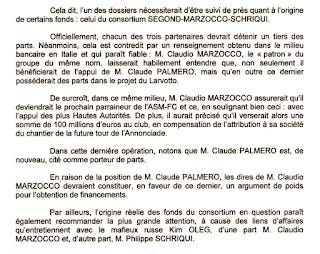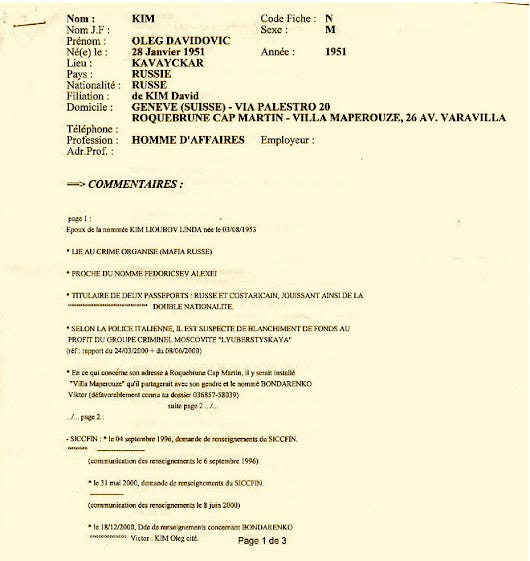Claude Palmero, the disgraced ex-accountant for Prince Albert of Monaco, is posturing himself in the French media as a “victim” while spouting outright lies.
Writes Le Monde in the third part of their special investigation quoting the treacherous Palmero and his self-serving notebooks:
September 2008. Palmero had been working for the prince for three years. He was assigned to study issues of general interest relating to Monaco. In the midst of the subprime crisis, the state was bogged down in a colossal project, extension into the sea (15 hectares reclaimed from the Mediterranean), at a cost of €9.5 billion. On September 19, 2008, Palmero wrote: "HSH, a little preoccupied, gave me the whole file and asked me to discreetly write him a report."
"I have submitted two reports that conclude that the call for tenders was biased. (...) I urge HSH to remain suspicious," he wrote. The following October 9, there was another meeting in the prince's office: "It's better to stop everything," warned Palmero, who prevailed, if his notebooks are anything to go by.
The truth of the matter is very different indeed.
As Albert’s intelligence chief, this is what I witnessed:
Monaco’s government invited blue-chip vendors to bid for the construction of the Larvotto Project, a land reclamation project off Monte Carlo’s beach to build habitable space upon the sea. This project was similar to what Monaco had achieved decades earlier in a suburban spinoff called Fontvieille.
These vendors paid millions of euros in fees just to formulate their bids and become part of the selection process.
Except for one, none of the vendors knew that the odds were heavily stacked against them from the get-go.
How so?
Because Palace accountant Claude Palmero had made secret deals to become a silent partner with one of the vendors, the Marzocco-Schriqui-Vinci consortium, in exchange for using his influence to rig the winning bid their way. And when Marzocco-Schriqui-Vinci got ruled out in the final round, Palmero convinced the Prince to terminate the Larvotto project altogether on the basis that it was bad for the environment.
However, from the beginning, all vendors were required to innovate the land reclamation into an environmental showcase—an example to the world of how modern construction can be executed without negative ecological impact. And they did just that.
Thus, the official reason for cancelling the project was bogus and these vendors had wasted their time and money.
A Palace insider told me back then: “They [Thierry Lacoste and Palmero] plan to resurrect the Larvotto project in a few years’ time, start fresh and get another shot at winning the bid.”
And, years later, that is precisely what happened.
The officers of SIGER, a crack police unit within Monaco’s police department, confirmed this arrangement to me having discovered the corruption while investigating Marzocco-Schriqui’s funding. They determined that this funding derived from a Russian mafia figure—an ethnic Korean from Kazakhstan named Oleg Davidovic Kim.
Kim, we then discovered, had falsified a Letter of Credit from the Bank of Tokyo. The bank's senior representatives affirmed to investigators that their bank never issued such a guarantee and that their signatures were forged. Yet with this letter of credit Kim managed to borrow $55 million from the Krasnoyarsk Aluminum Plant.
The Russian who arranged this “short-term” loan was Yuri Kolpakov. According to sources in the Russian government, investigators believe Kim then "ordered the killing" of Kolpakov in retaliation for pursuing the unpaid $55 million loan and for reporting Kim to the authorities.
We reported the corruption and sourcing to Prince Albert. (Monaco police reporting was repeatedly obstructed by Monaco’s interior ministry and consequently never reached the Palace, which is why our intelligence service was invaluable to Albert—and should have remained so.)
Thereafter, Claude Palmero conspired to disrupt the flow of intelligence to the Prince—and Albert ultimately chose to take the path of least resistance by allowing his accountant to run roughshod through the principality.








I re-read this very interesting article from an even more interesting intelligence individual
Mr Eringer and a old saying comes to mind. “Oh what a tangled web we weave when we practice to deceive” is the complete quotation from the epic poem Marmion: A Tale of Flodden Field (1808) by Sir Walter Scott. But then again Poet Scott did not know the slippery-ist people on the planet (S-POP)
"The Russians" who would far surpass the "Palace Intrigue" it seems now in Monaca.........
Got to give it to those Russian's where-ever there is MONEY there is OPORTUNITY. So lets talk about another little-ole Beach Town and complete with it's "Palace Intrigue" of Santa Barbara. As Mr. Eringer knows full-well that the Russians have a very dear place in their little-ole-mercenary hearts for SANTA BARBARA >>>>> Санта Барбара Форева! — Santa Barbara Forevah!
As shown in the oh-so-insightful Foreign Policy Article below, Santa Barbara LOVES Russian's and Russian's LOVE Santa Barbara. With SO MUCH LOVE in the air there has got to be something underneath all of this "skullduggery", what say you Mr. Eringer?
I quote from the Russian LOVES Santa Barbara Article above titled>>>>
https://foreignpolicy.com/2017/07/24/american-soap-opera-explains-how-russia-feels-about-everything-santa-barbara-trump-putin/
"The 1980s American Soap Opera That Explains How Russia Feels About Everything
A look at the peculiar obsession with “Santa Barbara” in the post-Soviet experience."
"I returned to the re-renamed city of my childhood and youth — Leningrad, USSR — in 1993. It was the first time I’d been back since immigrating to the United States seven years earlier. There were other signs of Santa Barbara’s presence in the city — improvised tributes to the American soap opera in the historic downtown area: a hole-in-the-wall café called Santa Barbara here, a Santa Barbara strip joint there. On several occasions I was asked, typically by women, whether I’d been to Santa Barbara myself and, if so, what it was like. I hadn’t, unfortunately. “You should go. That’d be the first place I would go if I could ever make it to America,” a middle-aged salesclerk at the grocery store said to me with mild reproach."
And sure enuf Russians and Ukraine FLOCKED to little-ole beach town of Santa Barbara as fast as they all could get US VISAs or manufacture a FRAUDULENT US VISAs just to come to RUSSIAN'S-HEAVEN
"S A N TA ........ B A R B A R A ....................."
I quote again from the article above>>>>>
"In Santa Barbara, people had manners. They had their self-respect about them. The men didn’t urinate in hallways or write obscene words on the walls of elevator cabins. They didn’t smash lightbulbs in entryways or drink cheap eau de Cologne first thing in the morning. They didn’t occupy the only toilet in the communal apartment for a good half-hour or keep their dirty combat boots and homemade barrels of pickled mushrooms in the communal bathroom. In Santa Barbara, men didn’t die of cirrhosis of the liver barely past their mid-50s, and there did not appear to be millions more women than men there, in Santa Barbara, or in America on the whole.
Yes lets keep on reading about RUSSIAN'S-LOVE-FOR-SANTA BARBARA>>>>
"An unfinished luxury home sits idle in a gated community in the Santa Barbara neighborhood of Kaliningrad, Russia. Arches similar to this one are a favorite architectural flourish from the show recreated in neighborhoods like this. The original Santa Barbara site in Kaliningrad expanded beyond the early plans for the development. Now there are three side-by-side neighborhoods — all called Santa Barbara.
"Santa Barbara was the first American soap opera to be broadcast on Russian television. It started airing on Jan. 2, 1992, with episode 217, and came to a close on April 17, 2002, with episode 2,040. For the first several years, the new episodes ran three evenings per week. Later on, the show’s broadcasts became fewer and further between."
"For 10 long years — all through the crime-ridden, chaotic 1990s, the early post-Soviet years of timelessness and hardship — life in large cities, small towns, industrial settlements, and snowbound villages across Russia’s 11 time zones would come to a standstill as the remarkably cheery sounds of Santa Barbara’s intro issued from millions of TV sets. “Run on home — you don’t want to miss Santa Barbara,” the kindly pharmacist from a TV commercial would say to the old woman at the counter. It was that big a deal. Missing an episode was considered to be a personal mini-tragedy."
"Santa Barbara’s imprint was everywhere. It entered the Russian vernacular, as a denotation for any hopelessly tortuous, excessively dramatic kind of relationship. (“Oh, I can’t stand those two, with their endless Santa Barbara!”) A well-known pop band, Mona Lisa, released a super-hit, “Santa Barbara,” in which young women proclaim their undying love for the character Mason Capwell (played by Lane Davies). "It was a national obsession [SANTA BARBARA] of borderline-insane magnitude."
"In Santa Barbara, it never snows. No one even thinks about snow there, ever. It never gets to be minus 30 degrees in Santa Barbara, regardless of whether the temperature is measured in Celsius or Fahrenheit. Santa Barbarians know no privations. For instance, they have no idea what it feels like when the heat radiators in your room go ice-cold in the middle of January. In Santa Barbara, people don’t ever go hungry, either. Tiny black-clad babushkas, bent at the waist like dwarf trees on the Arctic Ocean shore, don’t go to newly restocked and expanded post-shock, true capitalist food stores just to feast their purblind eyes on all those unimaginable food products they couldn’t in their wildest dreams afford on their miserable pensions: foreign cheeses and sausage, fresh meat, smoked fish. In Santa Barbara, old babushkas are not bent at the waist — they’re not even babushkas at all, and they certainly don’t live from month to month feeding themselves on nothing but black bread, rough, gray military-caliber macaroni and potatoes, and perhaps a few hard lumps of sugar to suck on while drinking their weak Krasnodar tea from chipped faience cups. When old people in Santa Barbara get sick, they are not told by bored-looking paramedics that they’ve already lived quite long enough for an ordinary human being, so there really would be no moral rationale for wasting the extremely limited hospital space on the likes of them."
"In the mid-1990s, there sprang to life a series of mini-Santa Barbaras — gated communities, microdistricts, bars, restaurants, hotels, clothing stores — all across the vast country. The name communicated exclusivity (one of the favorite Russian concepts and neologisms to emerge in the 1990s), mysterious foreignness, classiness, and extreme and timeless fashionability. What’s in a name? Everything, if, like everyone else, you would like to live the life of a Santa Barbara character but happen to have been born and are still residing in a depressingly unlovely place as far removed on every possible count from the actual (if thoroughly unreal) Santa Barbara as the distance between you and the moon. Nothing bad can happen to or in a place called Santa Barbara: In your imagination, it is the genius loci of your immediate world."
"And so mobsters from Kaliningrad, in the country’s extreme west — German Königsberg, occupied and annexed by the Soviet Union in 1945, birthplace of Immanuel Kant and Vladimir Putin’s ex-wife — travel to the United States to take a good firsthand look at the architecture of Santa Barbara-like gated communities, or at least that’s the rumor. They return to Russia — and bring a bit of Santa Barbara with them. (They like the arches in one place, the pillars and the soap’s signature gold coloristic spectrum in another.)" "Santa Barbara lives on."
Just like Mr. Eringer's "experience" with THE RUSSIAN'S, complete with the RUSSIAN MAFIA, mine was different when I stepped off the plane, for the first time, in Saint Petersburg International Airport in January 1997, where I was about to embark into the WORLD OF RUSSIA complete with it's RELIGIOUS FASCINATION with SANTA BARBARA unknown to me at the time.......... and as Mr. Eringer would find
in the little-ole-beach town of Monaco THE RUSSIAN MAFIA and I quote Mr. Eringer>>>>
"The officers of SIGER, a crack police unit within Monaco’s police department, confirmed this arrangement to me having discovered the corruption while investigating Marzocco-Schriqui’s funding. They determined that this funding derived from a Russian mafia figure—an ethnic Korean from Kazakhstan named Oleg Davidovic Kim."
The RUSSIAN MAFIA certainly loves little-ole Beach Towns just like Santa Barbara..............
But I have one question for Mr. Eringer? Who really is the MAFIA in Santa Barbara?
Howard Walther, member of Military Family
Another great article on the Russia Mafia and I quote " They determined that this funding had derived from a Russian mafia figure—an ethnic Korean from Kazakhstan named Oleg Davidovic Kim."
Seems the Russian Mafia is in Monaco and Santa Barbara since they love beach towns as shown
from this article "The Russian who arranged this “short-term” loan was Yuri Kolpakov. According to sources in the Russian government, investigators believe Kim then "ordered the killing" of Kolpakov in retaliation for pursuing the unpaid $55 million loan and for reporting Kim to the authorities."
The Russians are also in the South of Spain during the same types of crimes shown from Europol
"On 14 December, Europol supported the Spanish National Police (Policiá National) to take down a large Russian-speaking high-risk organized crime network involved in corruption and money laundering in Spain. The large-scale criminal network, implicated in a number of other criminal activities including murder, drug trafficking, arms trafficking, trafficking of human beings and extortion was active across Europe, South America and the United States. Given the high hierarchical position of those investigated, this operation, which began in 2013, is the largest against the Russian-speaking top-level organized crime in Spain in the past 10 years. "
Now the Russians are here in Santa Barbara and at it again, money Laundering and Blat -Bribery
Howard Walther member of a military family.